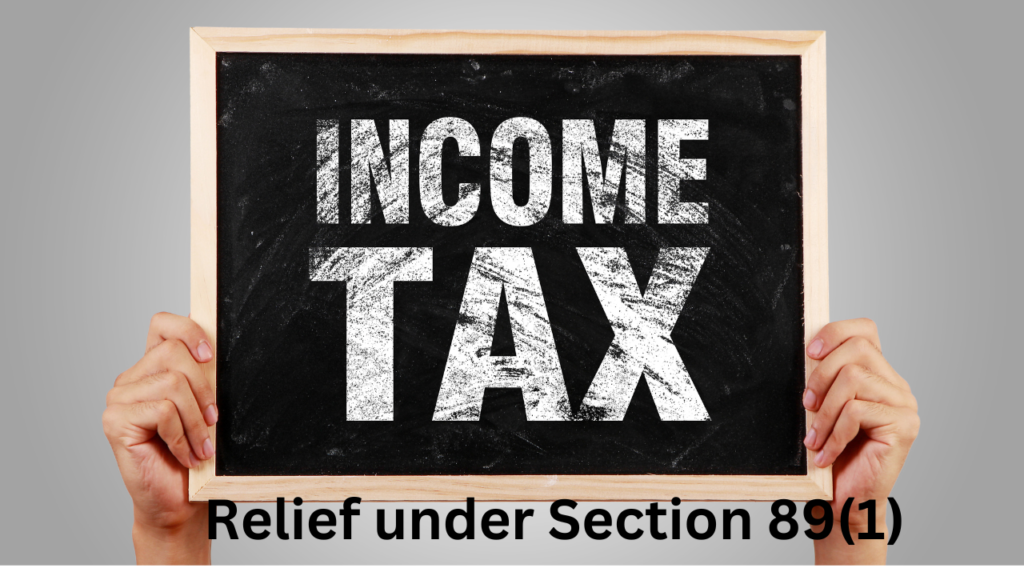Short Answer: ❌ No, it cannot be carried forward.

Why?
- Section 89(1) provides relief when you receive arrears or advance salary/pension, causing a higher tax liability in the year of receipt.
- The law requires that this relief must be calculated and claimed in the same financial year when the arrears or advance is received.
- If you miss claiming it, the Income Tax Act does not allow you to claim it in the next year.
Example for Better Understanding:
Imagine you received salary arrears of ₹5 lakh in FY 2022-23 but forgot to claim Section 89(1) relief in your Income Tax Return (ITR). Now, you are filing ITR for FY 2023-24 and want to claim it.
🚫 Not allowed! You must have claimed it in FY 2022-23 ITR, when the arrears were received.
2️⃣ What Can You Do If You Missed Claiming It?
You have two options, depending on the situation:
✅ Option 1: File a Revised Return (Before the Due Date)
- If the due date for revision has not expired, you can revise your ITR under Section 139(5).
- This allows you to correct mistakes and add relief under Section 89(1).
📌 Example:
- Suppose the last date for revising ITR for FY 2022-23 (AY 2023-24) is 31st December 2024.
- If today’s date is before this deadline, simply revise your return and claim relief.
🔹 How to do it?
- Log in to the Income Tax e-Filing portal.
- Select “File Revised Return.”
- Fill in Form 10E and attach it.
- Submit the return again.
✅ Option 2: Apply for Condonation of Delay (Section 119(2)(b))
If the time limit for revision is over, you must request the Income Tax Department to allow a late claim using Section 119(2)(b).
📌 What is Section 119(2)(b)?
- It is a special provision that allows the CBDT (Central Board of Direct Taxes) to grant permission to file a delayed claim for refunds or relief if the taxpayer has a genuine reason for the delay.
📌 Who Can Approve Your Request?
It depends on the amount of refund you are claiming:
| Authority | Can Approve If Refund is Up To |
|---|---|
| Assessing Officer (AO) | ₹10 lakh |
| Principal Chief Commissioner (PCCIT) / Chief Commissioner (CCIT) | ₹50 lakh |
| CBDT (Central Board of Direct Taxes) | More than ₹50 lakh |
✅ How to Apply for Condonation of Delay?
Follow these steps:
1️⃣ Write a Formal Application
- Address it to the Assessing Officer (AO) of your Income Tax Ward.
- Clearly explain why you missed the claim (e.g., oversight, illness, technical issues, employer delay in Form 10E).
- Request the condonation of delay and permission to file a revised ITR.
2️⃣ Attach Necessary Documents
- Form 10E (showing tax relief calculation).
- Copy of original ITR filed for that year.
- Proof of salary arrears (e.g., employer’s salary certificate, pay slips).
- Any supporting document for the delay (e.g., medical reports, employer letter, system failure screenshot).
3️⃣ Submit the Application
- Send it to the Jurisdictional Assessing Officer (AO).
- If the refund amount is above ₹10 lakh, send it to higher authorities (PCCIT/CCIT or CBDT).
- DRAFT APPLICATION FOR CONDONATION OF DELAY UNDER SECTION 119(2)(b)
- To,
- The Assessing Officer,
- [Your Income Tax Ward/Circle],
- [Income Tax Office Address],
- [City, State, PIN]
- Subject: Application for Condonation of Delay in Claiming Relief under Section 89(1) for Salary/Pension Arrears – Assessment Year [XXXX-XX]
- Respected Sir/Madam,
- I, [Your Name], son/daughter of [Father’s Name], PAN [XXXXXXXXXX], residing at [Your Address], respectfully submit this application under Section 119(2)(b) of the Income Tax Act, 1961, requesting condonation of delay in claiming relief under Section 89(1) for arrears received in the financial year [XXXX-XX].
- Details of the Case:
- Assessment Year: [XXXX-XX]
- Financial Year of Arrears Received: [XXXX-XX]
- Amount of Arrears Received: ₹[XXXXXX]
- Tax Relief Under Section 89(1) as per Form 10E: ₹[XXXXXX]
- Reason for Delay:
- The relief under Section 89(1) was not claimed in the original Income Tax Return due to [mention reason – oversight, illness, system error, delay in Form 10E filing, etc.].
- Since this relief is a statutory right, I request condonation of delay to enable me to claim the legitimate tax benefit.
- Justification for Condonation:
- The delay in filing the claim was unintentional and due to a genuine hardship.
- If the relief is not granted, it will result in undue hardship and excess tax payment.
- CBDT has issued circulars allowing condonation for genuine cases, and similar reliefs have been granted in past cases.
- Documents Enclosed:
- Copy of Form 10E submission acknowledgment.
- Copy of original ITR filed for AY [XXXX-XX].
- Computation sheet showing tax relief under Section 89(1).
- Supporting documents for the reason of delay (medical certificate/employer letter, etc.).
- Prayer:
- I humbly request you to kindly condone the delay in claiming relief under Section 89(1) and allow me to file a revised return to claim the rightful tax benefit.
- Thank you for your time and consideration.
- Yours sincerely,
- [Your Name]
- PAN: [XXXXXXXXXX]
- Mobile: [XXXXXXXXXX]
- Email: [Your Email]
- Date: [DD/MM/YYYY]
- Place: [Your City]
✅ Key Points to Remember
✔ The delay must be due to a valid reason, not negligence.
✔ The Income Tax Department has the discretion to accept or reject your request.
✔ If approved, you can file a revised return and claim your tax relief.
📌 Conclusion: What Should You Do Now?
✅ If the due date for revision has not passed → File a revised return under Section 139(5).
✅ If the due date has passed → Apply for condonation under Section 119(2)(b